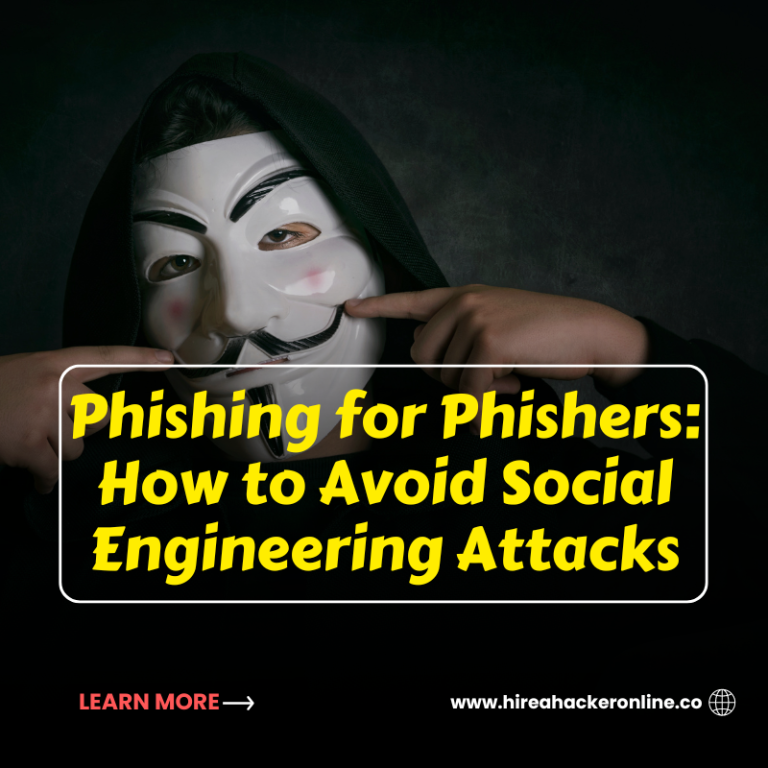In the digital age, where information is currency, the art of deception has evolved into a sophisticated cybercrime known as social engineering. Phishing, a prime example, lures unsuspecting individuals into divulging sensitive information through fraudulent emails, messages, or websites. But what if we could turn the tables on these digital predators? Let’s dive into the world of phishing for phishers and learn how to protect ourselves from these cunning attacks.
Understanding the Phishing Threat
Phishing attacks exploit human psychology, leveraging trust, urgency, and fear to manipulate victims. These attacks can range from simple attempts to steal login credentials to elaborate schemes designed to infect computers with malware or compromise financial accounts. To outsmart these cybercriminals, we must first understand their tactics.
Common Phishing Tactics
- Impersonation: Phishers often masquerade as trusted entities like banks, social media platforms, or government agencies to gain credibility.
- Urgency: Creating a sense of urgency, such as a limited-time offer or an account being compromised, can pressure victims into hasty decisions.
- Fear: Threats of account suspension, legal action, or financial loss can induce panic and lead to careless actions.
- Greed: Promises of easy money or valuable prizes can tempt victims to click on malicious links or download attachments.
Spotting the Phishing Hooks
To avoid falling victim to phishing attacks, it’s essential to develop a keen eye for suspicious activity. Here are some red flags to watch for:
- Unexpected Emails: Be wary of emails from unknown senders or unexpected requests from familiar contacts.
- Generic Greetings: Legitimate emails often use personalized greetings, while phishing emails may use generic salutations like “Dear Customer.”
- Suspicious Links and Attachments: Hover over links to check the actual URL before clicking, and avoid opening attachments from unknown sources.
- Poor Grammar and Spelling: Phishing emails may contain grammatical errors or typos, indicating a lack of professionalism.
- Sense of Urgency: Be cautious of emails demanding immediate action or threatening consequences if you don’t comply.
Protecting Yourself from Phishing
- Educate Yourself: Stay informed about the latest phishing tactics by reading security blogs and news articles.
- Enable Two-Factor Authentication: This extra layer of security adds significant protection to your online accounts.
- Use Strong, Unique Passwords: Create complex passwords for each of your online accounts and consider using a password manager.
- Be Wary of Social Media: Avoid clicking on links or downloading files from suspicious social media profiles.
- Regularly Update Software: Keep your operating system and software applications up-to-date with the latest security patches.
Reporting Phishing Attempts
If you encounter a phishing email, report it to your email provider and the appropriate authorities. By doing so, you can help protect others from falling victim to the same scam.
Additional Tips:
- Use a reputable antivirus and anti-malware software: Keep your devices protected with up-to-date security software.
- Be cautious of public Wi-Fi networks: Avoid accessing sensitive information on unsecured Wi-Fi hotspots.
- Regularly backup your data: In case of a successful attack, having backups can help minimize data loss.
By adopting these measures and staying informed, you can effectively protect yourself from the ever-evolving world of phishing attacks.
Conclusion
While phishing attacks pose a significant threat, knowledge and vigilance are your strongest defenses. By understanding the tactics used by phishers and following best practices, you can significantly reduce your risk of becoming a victim. Remember, when in doubt, err on the side of caution and take the time to verify information before taking any action.




